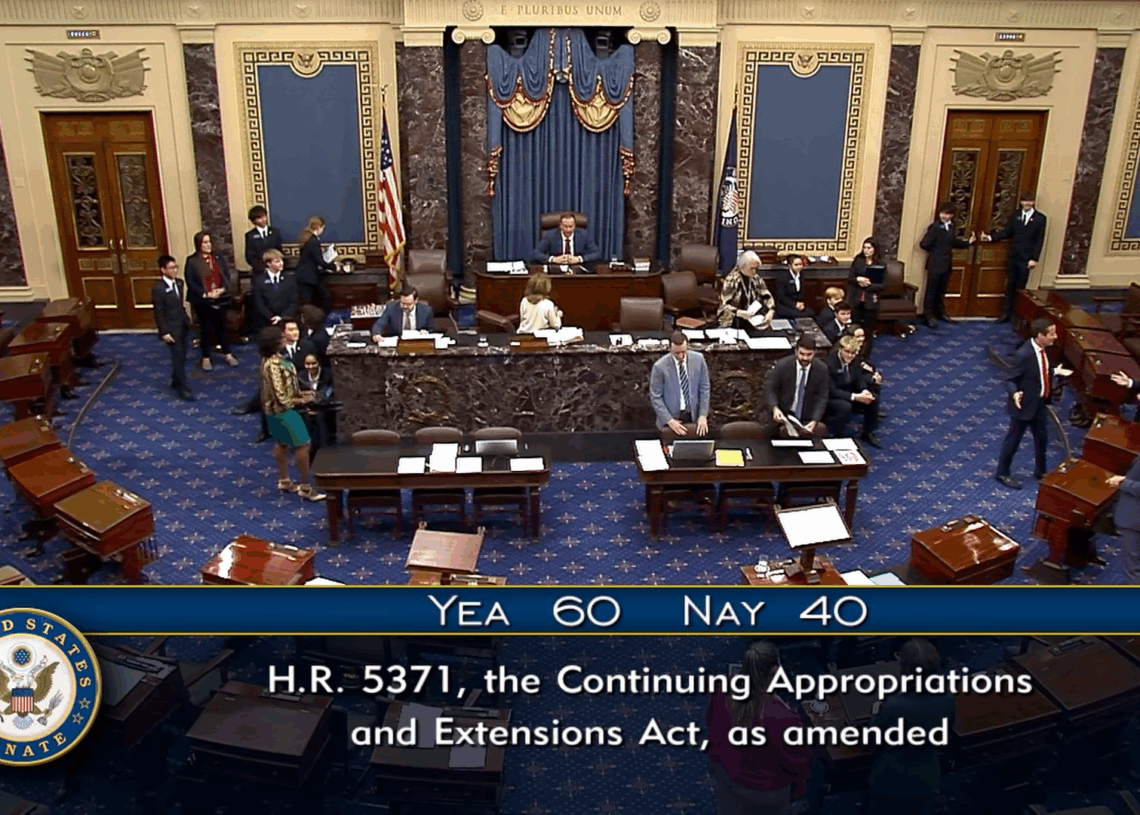The Senate passed a bill to reopen the federal government Monday evening, taking the next step toward ending the longest shutdown in U.S. history.
The chamber had already agreed to speed up the process to pass a bipartisan agreement struck over the weekend. The measure will now head to the House, which is expected to vote as early as Wednesday after staying away from Washington for more than 50 days.
The Senate passed a bill to reopen the federal government Monday evening, taking the next step toward ending the longest shutdown in U.S. history.
The chamber had already agreed to speed up the process to pass a bipartisan agreement struck over the weekend. The measure will now head to the House, which is expected to vote as early as Wednesday after staying away from Washington for more than 50 days.
“I could spend an hour talking about all the problems we’ve seen, which have snowballed the longer this shutdown has gone on,” Senate Majority Leader John Thune (R-South Dakota) said in a floor speech Monday. “But all of us, Democrat and Republican, who voted for last night’s bill are well aware of the facts, and I am grateful that the end is in sight.”
The bill passed 60-40, with seven Democrats and Sen. Angus King (I-Maine) joining Republicans to pass it. One Republican, Sen. Rand Paul (Kentucky), voted no.
The path forward in the House is narrow. House Minority Leader Hakeem Jeffries (D-New York) is pushing House Democrats to vote against it, while most House Republicans are expected to support it. But Republicans hold a slim margin — they can lose only two votes and still pass the bill if all Democrats vote against it.
Should the bill pass, President Donald Trump is expected to sign it into law.
The bipartisan compromise in the Senate combines three full-year funding measures for specific parts of the government into one package, along with a stopgap funding bill for the rest of it through Jan. 30.
The bill would also reverse more than 4,000 federal layoffs the Trump administration attempted to implement earlier in the shutdown and prevent future layoffs through Jan. 30, easing pressure on a federal workforce reeling from tens of thousands of layoffs this year. The deal would appropriate funding for the Supplemental Nutrition Assistance Program, also known as SNAP or food stamps, through September.
But it would not extend Affordable Care Act subsidies set to expire at the end of the year, increasing health care costs for millions of Americans.
Democrats had demanded throughout the shutdown that Republicans negotiate with them to extend the subsidies, but the GOP insisted it would not discuss health policy unless the government reopened.
The shutdown has entered its 42nd day, and most federal employees haven’t been paid since it began. Effects are piling up: Hundreds of thousands are working without salaries, and many others are furloughed. Airline delays have cascaded because of air traffic control shortages, and November’s SNAP payments went out late — and only under a court order. National parks and museums in D.C. have been closed.
As part of the deal to reopen the government, Thune has promised a vote by the second week of December on a policy of Democrats’ choosing to extend the ACA subsidies.
But it is unclear whether a measure to extend the subsidies — which Democrats put in place under President Joe Biden — could get enough support from Senate Republicans to pass. Many Republicans oppose extending the subsidies, and others have said they cannot support extending them without making changes to the program.
The subsidies’ fate in the House is even less clear. Speaker Mike Johnson (R-Louisiana) did not say Monday whether he would hold a vote on the issue if it passed the Senate. Last week, Johnson said he was “not promising anybody anything.”
Johnson has kept the House out of session for weeks to put pressure on Senate Democrats to accept a GOP funding extension.
Senate Minority Leader Charles E. Schumer (D-New York), who voted against the deal, argued that the public will remember the shutdown as a Republican failure to act on health care.
“Doing nothing is unacceptable, but that’s the choice the Republican side made in obeisance to Donald Trump,” he said. “Republicans own this health care crisis. They knew it was coming. We wanted to fix it. Republicans said no, and now it’s on them.”
Schumer and most Democrats opposed the bill, but enough Senate Democrats joined Republicans to deliver the 60 votes necessary for passage. Some liberal activists were nonetheless furious with Schumer for failing to prevent the bill from passing. At least half a dozen House Democrats — Reps. Ro Khanna (California), Seth Moulton (Massachusetts), Delia C. Ramirez (Illinois), Shri Thanedar (Michigan), Rashida Tlaib (Michigan) and Mike Levin (California) — called for him to step down as Senate Democratic leader.
But Jeffries defended Schumer, telling reporters that he believed Schumer was an effective leader. After a similar standoff in March ended with Democrats allowing a government spending bill to proceed, Jeffries declined to answer questions about his confidence in his fellow New Yorker.
“Leader Schumer and Senate Democrats over the last seven weeks have waged a valiant fight on behalf of the American people,” Jeffries said. “And I’m not going to explain what a handful of Senate Democrats have decided to do. That’s their explanation to offer to the American people.”
The Senate rejected an amendment Monday night from Sen. Tammy Baldwin (D-Wisconsin) to extend the ACA subsidies by one year.
The chamber took the first step to reopen the government Sunday night, getting just enough votes to move forward with the help of seven Democrats and one independent senator. The decision split the caucus, prompting immediate backlash from most rank-and-file Democrats in both chambers and a pledge from Schumer and Jeffries to vote against it.
Sen. Jeanne Shaheen (D-New Hampshire) was one of the Democrats who brokered the deal to end the shutdown.
“This was the option on the table,” she said Monday. “We had reached a point where I think a number of us believed that the shutdown had been very effective in raising the concern about health care and health insurance and the need to address that. And this gives us an opportunity to continue to address that moving forward.”
Marianna Sotomayor contributed to this report.
The post Deal to end government shutdown passes Senate, heads to House
appeared first on Washington Post.




